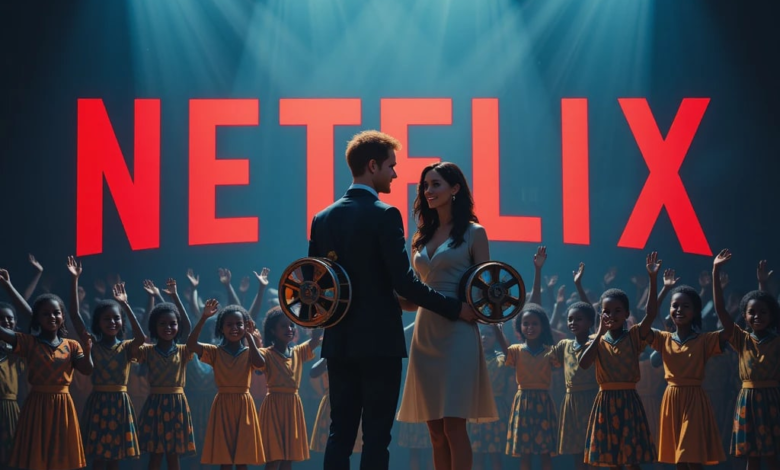Harry & Meghan’s Netflix Dilemma: Inspiration or Exploitation?

When Prince Harry and Meghan Markle first signed their Netflix deal, the world expected blockbuster documentaries, heartfelt storytelling, and game-changing projects. Years later, the results have been mixed. Now, with their latest project featuring Uganda’s Masaka Kids, the couple has stepped into yet another heated debate: is this meaningful philanthropy, or just another PR play disguised as compassion?
The Masaka Kids Phenomenon
The Masaka Kids are not new to the world stage. Their joyful, high-energy dance performances have gone viral across YouTube, TikTok, and Instagram, inspiring millions with stories of resilience in the face of tragedy. These children, many of whom have faced extreme hardship, turned music and dance into a celebration of hope. Their videos spread far before Meghan and Harry ever entered the picture.
So why the Sussex stamp now? According to Netflix announcements, Harry and Meghan’s Archewell Productions is behind a short documentary highlighting the group. On paper, it sounds like a perfect fit — children overcoming adversity, art as survival, hope as a global message. But critics argue the couple didn’t build this story; they simply attached themselves to an already viral success.
The “Produced By” Question
A closer look suggests that much of the heavy lifting was done by actual filmmakers, including Ugandan director Moses Bwayo and New York-based producers. Reports indicate that Archewell simply acquired naming rights, added its logo, and took on the “producer” credit. To some, this feels familiar. Their earlier projects, like Live to Lead, also leaned heavily on outside creators.
That doesn’t automatically erase value — many celebrities back projects without being on the ground. But for Meghan and Harry, who are constantly fighting the perception that they’re more about headlines than hard work, this approach feeds an existing narrative: that they’re using their brand to appear influential while others carry the real weight.
White Savior Criticism
There’s another layer here: the long history of Western celebrities spotlighting African children in ways that can appear exploitative. For decades, critics have called this the “white savior complex” — when well-off outsiders use stories of suffering communities as props for their own image.
Harry has often been connected to Africa, calling it a place of healing and sanctuary. But that association also carries baggage. Skeptics point out that repeatedly centering their charitable branding around African children or communities risks reducing complex realities into feel-good photo ops. Meghan joining that narrative, especially through a glossy Netflix project, makes the optics even more delicate.
The Good vs. The Optics
To be fair, there are positives here. The Masaka Kids deserve every spotlight they can get. Exposure through Netflix could open doors for global partnerships, funding, and long-term sustainability for their community. Millions who never saw their viral videos may now discover their story.
But the question isn’t whether the kids benefit — it’s whether Harry and Meghan benefit more. Do they genuinely amplify voices, or do they leverage those voices as another stepping stone to maintain relevance? The line between empowerment and exploitation is razor thin, and the Sussexes’ own PR history makes people suspicious.
Archewell’s Reputation Problem
Part of the issue is credibility. Archewell has launched numerous initiatives — from women’s health campaigns to global education programs — but many of those efforts have faded quickly after splashy press releases. Announcements are made, headlines generated, and then silence follows. Skeptics wonder: will this project be any different, or will it join the list of short-lived, PR-heavy efforts?
That’s the heart of the criticism. If Harry and Meghan want to be seen as true changemakers in Hollywood and beyond, they can’t just sign their names on already polished stories. They need to invest deeply, create authentically, and stay the course.
Will Audiences Care?
Another practical question: will Netflix audiences actually watch? Subscribers come for Stranger Things or Bridgerton. A short doc about African children, however moving, risks disappearing into the endless library of niche content. It may earn headlines in People or Vanity Fair, but whether viewers stream it in large numbers is another story.
If the project fades quickly, the criticism about superficiality will only grow louder.
The Bigger Picture
Ultimately, this documentary highlights the challenge the Sussexes face in their post-royal era. They don’t just need to tell stories — they need to tell them in ways that feel authentic, original, and necessary. Their names alone no longer guarantee attention.
The Masaka Kids doc could be a beautiful showcase of resilience, or it could be remembered as another Archewell-branded press cycle with little long-term impact. The deciding factor will be whether Harry and Meghan step back and let the children’s voices remain the center — not their own.
Because if the kids’ story shines, audiences might forgive the optics. But if it looks like another round of performative philanthropy, then the Sussexes may find their brand sinking deeper into skepticism.
For Harry and Meghan, this isn’t just about producing content. It’s about proving they can contribute meaningfully in Hollywood without looking opportunistic. The world will be watching — not just the kids dancing, but the couple behind the credits.
Source link




